BIENVENUE CHEZ LES CH’TIS (Welcome to the Sticks or Welcome to the Land of Shtis) is a 2008 French comedy film starring Kad Merad, Dany Boon and Zoé Félix. A man  born and raised on France’s Southern coast is exiled to the Northern territories in this comedy from actor, director and screenwriter Dany Boon.The film broke nearly every box office record in France: it debuted as the top film at 793 sites. As of 28 February 2010, the film had been seen by 20.5 million people in 23 weeks, thereby breaking the long-standing record held by 1966′s La Grande Vadrouille (17.27 million admissions). The film has grossed US$192,928,551 in the box-office in France alone.
born and raised on France’s Southern coast is exiled to the Northern territories in this comedy from actor, director and screenwriter Dany Boon.The film broke nearly every box office record in France: it debuted as the top film at 793 sites. As of 28 February 2010, the film had been seen by 20.5 million people in 23 weeks, thereby breaking the long-standing record held by 1966′s La Grande Vadrouille (17.27 million admissions). The film has grossed US$192,928,551 in the box-office in France alone.
Philippe Abrams (Kad Merad) is the manager of the postal service (La Poste) in Salon-de-Provence, Bouches-du-Rhône, in southern France. He is married to Julie (Zoe Felix), whose depressive nature makes his life impossible. She has been down in the dumps. At the constant urging of his wife, has long been lobbying for a transfer to one of the much-coveted positions in the more glamorous surroundings of Côte d’Azur, he thinks would be one way to lift her spirits. As this favourable position will be granted to somebody who is disabled, Abrams decides to pretend that he is. However, Philippe’s attempts to finagle a transfer (by pretending that he is handicapped) fail. The management finds out. When the ruse is discovered, he ends up instead, being transferred to Bergues, as punishment with a forced relocation.
Bergues is a village in Northern France that lies stuck between Belgium and the English Channel, near Dunkirk in northern France – and the Nord-Pas-de-Calais region in particular. For years the northern region, Nord-Pas de Calais, has been stereotyped as a miserable hell of disused coal mines and rusting factories, where alcoholic, unemployed or suicidal inhabitants keep warm by beating each other up or gorging on chips with vinegar. The British might think of Calais as a bounteous land of booze cruises and Channel tunnel coach tours, but in France it’s grim up north. These depressed and rain-soaked northerners, nicknamed Ch’tis, spoke an indecipherable patois, Ch’timi, and were thought to have changed little since Emile Zola captured their bleak existence in his 19th century mining novel, Germinal. It is considered “the sticks” – a cold and rainy place inhabited by unsophisticated ch’tis who speak a strange language called “ch’ti” in local parlance, and “cheutimi” in the South (In this area, the indigenes speak a language known as Picard – an amalgam of French, Flemish and Latin).
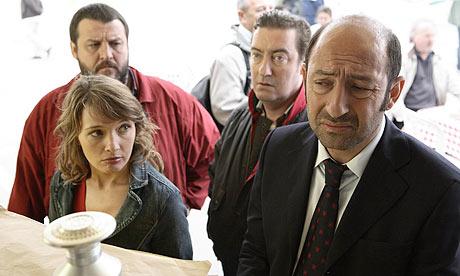
For the Abrams, very prejudiced southerners, the North is a nightmare, a freezing region, inhabited by uncouth beings, spluttering out an incomprehensible language. Philippe essentially perceives the region as the “Siberia of France.” Judging by the grim look on his wife’s face, one would suspect that Philippe was being sent to the front-lines, never to return, when he says goodbye to her and his young son. Philippe goes alone. With misery in his heart, he dons extreme winter clothing and trudges off to his new post, saying goodbye to Julie and their son, who opt to stay behind. On the motorway Philippe is stopped by a policeman for travelling too slowly, but when he hears about the driver’s final destination he can only offer his commiserations and wave him on his lonely way. To make matters worse, not long after arriving in Bergues, Philippe nearly runs over a man while driving home drunk — who turns out to be one of his new colleagues at the post office. He has to spend his first night at Antoine’s place – Antoine is one of his co-workers. First Philippe dislikes Antoine for his rudeness and because he thinks Antoine is gay (actually, he found photographs of Antoine dressed as a woman, but they were taken during a carnival party).
To his great surprise, he discovers Bergues a charming place, a warm bunch and welcoming people. After a rocky start in which Philippe finds himself knee-deep in misunderstandings and struggling to grasp the area’s unique dialect, he soon finds his bearings and is given a warm welcome by his fellow post office employees. These include 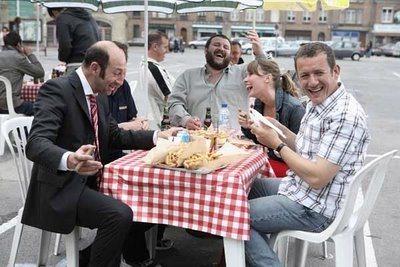
But for some reason he feels compelled to maintain an unhappy façade in front of his friends and family back home, regaling them with horror stories on his weekend visits.
When Philippe returns to Salon over the weekend he tries to describe the happy turn of events to his wife who has remained in the South with their young son, but Julie refuses to believe that he likes it in the North. She even thinks that he is lying so as not to upset her. This inspires Philippe to tell her what she wants to believe: that his life is wretched there. Inevitably, these tall tales come back to haunt him when his wife (Zoé Félix) decides it is her duty to stand by her man in this hellhole. She decides to join him in the North to relieve his gloom. Philippe must either tell the truth, or keep deceiving her. He is also forced to confess to his new friends and colleagues that he has described them as barbarians to his wife. First, they are angry, but they then decide to help him by behaving as such to cover for his lies and to scare Julie so she will depart quickly. Also they let her stay in the old mining place of Bergues, pretending it is the main town. Julie has a very bad weekend. Just when she’s ready to go back south, she discovers that she has been tricked when a local biker tells Julie that the actual town of Bergues is several kilometers away. When Philippe finds Julie at his real Bergues home, he tells her the truth about the happiness and friendship that the town has brought him. Julie is disappointed at first, but after realising her husband is happy, she decides ultimately to move to Bergues to stay with Phillipe, to be supportive.
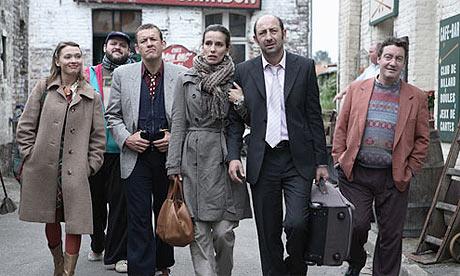
Meanwhile, Antoine and Annabelle who had been dating for over a year, but had broken up due to Antoine’s passiveness towards his mother still nurse hopes for their relationship. 
Three years later, Phillipe receives a transfer to move south. Accepting the offer, Phillipe and his family move south. Just as he is about to say goodbye, he is reduced to tears, proving Antoine’s theory on the Ch’tis proverb (“A visitor brays [cries] twice up north: once on his arrival and once at his departure.”)
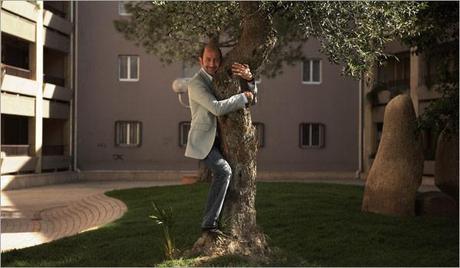
Bienvenue chez les Ch’tis is based around the perception that life in the south of France is nothing much gorgeous sunshine and happiness, while the north of the country is a cold and miserable place to be; but Boon, a native of Nord-Pas de Calais, wants to show us that things aren’t as grim up north as many might think. One can see why Pathé (the producers) feared this might not fly at the local US multiplex. How could people be expected to laugh at intricate misapprehensions of a language they don’t even understand? But there is no problem whatsoever, such is the ingenuity of the writing, the fluency and comic timing of the actors, and in particular the assured direction of Dany Boon, who happens to be a Ch’ti himself. Such a success can only be attributed to the way Dany Boon’s film touches upon national stereotypes and prejudices. Such a scenario inevitably doesn’t hold as much resonance for viewers outside of France, but Bienvenue chez les Ch’tis possesses a warm sense of humour that should translate for most audiences.
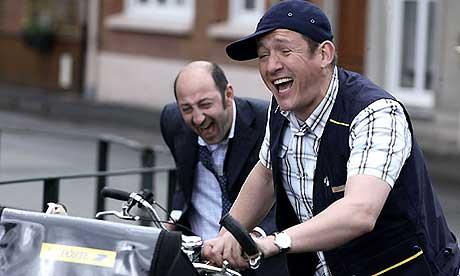
There are two or three hilarious sequences in Bienvenue chez les Ch’tis. One occurs early on when Philippe’s attempt to play his non-existent disabled card descend into slapstick; another sees Philippe and Antoine cycling haphazardly around Bergues while growing increasingly inebriated; and the big set-piece in which the whole town try to convince Philippe’s wife that life here is every bit as horrific as she’s heard is very funny indeed. Aside from those instances, however, the comedy in this picture is of a determinedly gentle variety, and while it’s far from unappealing it isn’t quite amusing enough to distract from the film’s laziness in other areas.
The subtitler succeeds in matching French mis-speaks with plausible English equivalents in a tour de force which merits the creation of a whole new Oscar category and provides 
The acting is very strong across the board, with Boon being a dab hand at playing the likable dolt (as he showed in Patrice Leconte’s My Best Friend), and he is assisted by particularly strong work from both Merad and the heart-stoppingly beautiful Marivin.
The film’s writer, director and co-star, the popular comedian Dany Boon, is a proud Ch’ti and son of an Algerian truck driver and a French cleaner. He has succeeded in turning around the French cinematic cliché that romping comedies take place in the south, usually on a beach, and the north is reserved for depressing social realism. He said: “I wanted to make a very human comedy where the main character, an outsider, discovers the Ch’timi culture and warmth … summed up in the proverb: ‘An outsider who comes to the north cries twice, once when he arrives, and once when he leaves’.”
“Bienvenue Chez les Ch’tis” (“Welcome to the Sticks”), has been attracting filmgoers in astounding numbers. The movie has sold close to 19 million tickets in a country of 65 

PRODUCTION CREDITS
Director – Dany Boon / Screenplay – Dany Boon
Screenplay – Franck Magnier
Executive Producer – Eric Hubert
ACTING CREDITS
Kad Merad – Philippe Abrams
Dany Boon – Antoine Bailleul
Zoe Felix – Julie Abrams
Philippe Duquesne – Fabrice Canoli
Jacques BonnaffeLine Renaud – Madame Bailleul
Stephane Freiss – Jean Sabrier, Philippe’s Superior
Michel Galabru – Julie’s Great-Uncle
Anne Marivin – Annabelle Deconninck
Guy Lecluyse – Yann Vandernoout
Patrick Bosso – Policeman ‘A7′
Zinedine Soualem – Momo
Jerome Commandeur – Inspector Lebic
Christophe Rossignon – Brasserie Waiter
Yael Boon – Angry Post Office Customer
Alexandre Carriere – Tony
Lorenzo Ausilia Foret – Raphael Abrams
Fred Personne – Monsieur Vasseur
Franck Andrieux – Monsieur Leborgne
Jean-Christophe Herbeth – Monsieur Mahieux
Jean-Pierre Picotin – Monsieur Tizaute
Jenny Cleve – Grandma ‘Quinquin’
Claude Talpaert – Grandpa Quinquin
Sylviane Goudal – Post Office Customer
Maryline Delbarre – Martine de Momo
Guillaume Morand – Old colleague of Phillipe’s
Yann Konigsberg – Jean’s Salon Colleague 2
Nadege Beausson-Diagne – Salon Employee
Jean-Francois Elberg – Service Station Employee
Eric Bleuze – Man on Moped
Bruno Tuchszer – Bergues Policeman 1
Mickael Angele – Bar Owner in Mining Town
Patrick Cohen – Customer Thrown Out of Bar
Louisette Douchin – Woman with Mussels
Jean-Marc Vauthier – Miner
Cedric Magyari – Miner
Theo Behague – Local Child
Mathieu Sophys – Local Child
Laetitia Maisonhaute – Jean’s Secretary
